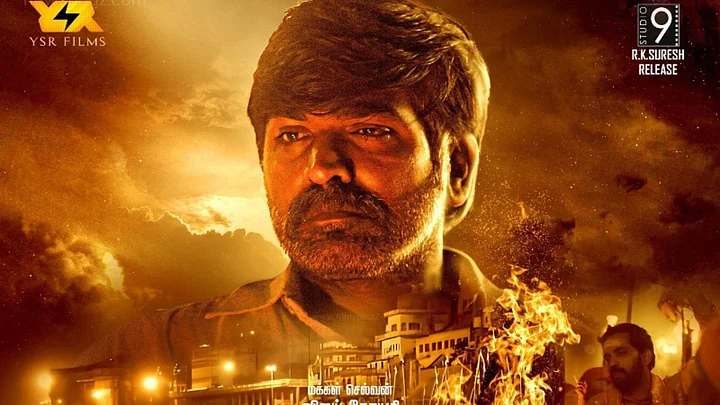Amidst the larger than life and power packed action films which are high on violence, Maamanithan detours to show us a simple and realistic world filled with humans who are high on vulnerable emotions.
Vijaysethupathi who made his debut as a lead actor in Seenu Ramasamy’s National award-winning Thenmerku Paruvakaatru has collaborated with the director for the fourth time in Maamanithan after Idam Porul Yaeval and Dharma Durai.
Bankrolled by Yuvan Shankar Raja who also has joined hands with his father, maestro Ilaiyaraaja for the first time to compose the music and background score of Maamanithan, the film stars Gayathrie, Anikha Surendran, KPAC Lalitha, Guru Somasundaram and Shaji Chen.
The story revolves around the family man Radhakrishnan (Vijay Sethupathi), his wife (Gayathrie), and two kids. He ventures into a new career with his 'work ethic and reputation' as an investment only to feel cheated by a real estate fraud. Having lost the trust of the villagers who lent him money, he deserts his family and goes on a run. Will there be redemption? That is the rest of the story.
The film beautifully captures the journey of a Manithan (a man) with a burning desire to provide a better life for his family, the emotional turmoil he goes through during the process, and how he eventually ends up becoming a Maamanithan (a great man).
What sounds like a boring piece of advice from a father to his kids in the first half becomes extremely emotional when it is used as a call back towards the intermission - ‘Run, when you go through hardships for it, makes you feel fresh and gives you better clarity to deal with the problem at hand.'
Though the film is confined to very few characters of Radhakrishnan's family and friends, the scenes to represent the bond and the drama around them looked fresh and different. For instance, it was interesting and funny to see the hero use his horoscope as a love letter.
While the film can come across as a pleasant and light-hearted drama, if you observe closely, it has strong political layers. The dialogues are extremely powerful as they are laced with intricacies of socio-political issues that a common man faces on a daily basis.
Maamanithan delves into the communal harmony and the unconditional love that people from different faiths hold, touches upon ethics and morals, on why it is important to question big corporations that run profitable businesses instead of local vendors who sell cigarettes for livelihood and why it is essential to demarcate business and personal bonds in friendships.
The film does leave you with some unanswered questions. For instance, Radhakrishnan who stands up for himself when he is insulted by his to-be brother-in-law for not being educated, ironically insists on marrying only an educated girl.
When her brother takes an important life decision about her marriage, Savitri stands up for herself claiming she is educated and that she can decide for herself. However, in the later half of the film when she faces a crisis, she helplessly hopes her husband who is on the run returns, wishes her dead father was around to support her and waits for her young son to grow up and take care of the family. Where did her confidence in being educated disappear suddenly? Why did she have to become the usual 'damsel in distress seeking a man to save her life’, to a point where she even regretted cutting ties with her toxic brother who might have been of some help?
While humor is peppered throughout the film, melodrama and cliches kick in the second half to make the screenplay dragged out and lets one disengage with the story slightly.
However, the intense climax sequence where Vijaysethupathi screams his lungs out will transfer the pain directly from the screen to our hearts. That stands as a testament to the finesse he has over his craft as an actor.
Maamanithan has its heart at the right place for it instills hope in human relationships, explaining while there may be one or two who will cheat or hurt you, there will be dozens waiting to support and embrace you with love.
The film is currently running in theatres.
(At The Quint, we question everything. Play an active role in shaping our journalism by becoming a member today.)
